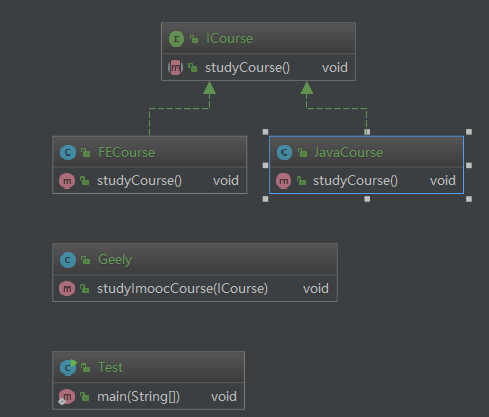# 依赖倒置原则
定义:高层模块(指应用模块)不应该依赖底层模块,二者都应该依赖其抽象
- 抽象不应该依赖细节;细节应该依赖抽象
- 针对接口编程,不要针对实现编程
核心思想:面向接口编程
优点:
- 减少类之间的耦合性
- 提高系统稳定性
- 提高代码可读性和维护性
- 可降低修改程序锁造成的风险
# coding
场景:Geely 在慕课上学习课程,学习 Java 课程,学习前端课程。
package cn.mrcode.newstudy.design.pattern.principle.dependencyinversion;
public class Geely {
public void studyJavaCourse() {
System.out.println("Geely 在学习 Java 课程");
}
public void studyFECourse() {
System.out.println("Geely 在学习 FE 课程");
}
}
1
2
3
4
5
6
7
8
9
10
11
12
2
3
4
5
6
7
8
9
10
11
12
package cn.mrcode.newstudy.design.pattern.principle.dependencyinversion;
public class Test {
public static void main(String[] args) {
Geely geely = new Geely();
geely.studyJavaCourse();
geely.studyFECourse();
}
}
1
2
3
4
5
6
7
8
9
10
2
3
4
5
6
7
8
9
10
Geely 在学习 Java 课程
Geely 在学习 FE 课程
1
2
2
现在的问题是:如果要再增加一门学习课程呢?那么解决的方案只能在 Geely 类中增加另外一门课程的方法,然后Test(应用层)再调用该方法
这破坏了_依赖倒置原则_,Test(应用层)依赖Geely(底层模块)。下面使用依赖倒置原则来进行修改
public interface ICourse {
void studyCourse();
}
1
2
3
2
3
public class JavaCourse implements ICourse {
@Override
public void studyCourse() {
System.out.println("Geely 在学习 Java 课程");
}
}
1
2
3
4
5
6
2
3
4
5
6
public class FECourse implements ICourse {
@Override
public void studyCourse() {
System.out.println("Geely 在学习 FE 课程");
}
}
1
2
3
4
5
6
2
3
4
5
6
public class Geely {
public void studyImoocCourse(ICourse iCourse) {
iCourse.studyCourse();
}
}
1
2
3
4
5
2
3
4
5
public static void main(String[] args) {
// v1 不使用依赖倒置原则
// Geely geely = new Geely();
// geely.studyJavaCourse();
// geely.studyFECourse();
// geely.studyPythonCourse();
Geely geely = new Geely();
geely.studyImoocCourse(new JavaCourse());
geely.studyImoocCourse(new FECourse());
}
1
2
3
4
5
6
7
8
9
10
11
2
3
4
5
6
7
8
9
10
11

上面这个示例:
- geely 学习什么课程由 Test(应用层决定,高层模块)
- 再学习其他的课程,只需要扩展课程即可。而 geely 不需要变动
- 在底层模块扩展
- 是扩展课程,而不是去修改已有的 JavaCourse ,这也符合了_开闭原则_
- 面向接口编程,而不是面对 Geely
- Test 与 Geely 是解耦的
- Gelly 与 具体的课程实现是解耦的
- Gelly 与 ICourse 是有依赖的
- 所谓高内聚,低耦合,就是尽量减少耦合
这里只是一种写法,
- 由方法参数传递进去,
- 还可以从构造函数传递(不过这样一个 geely 实例就只能学习一种课程了)
- 还可以设置一个set方法,每次学习前,把课程set进去
// v3
// Geely geely = new Geely(new JavaCourse());
// geely.studyImoocCourse();
Geely geely = new Geely();
geely.setCourse(new JavaCourse())
geely.studyImoocCourse();
geely.setCourse(new FECourse())
geely.studyImoocCourse();
1
2
3
4
5
6
7
8
9
10
2
3
4
5
6
7
8
9
10
依赖倒置原则表现了一种事实:
- 相对于细节的多变性,抽象的东西要稳定得多
- 以抽象搭建起来的架构,比以细节搭建起来的要稳定得多
那么抽象的目的也就是:制定好规范和契约,如 ICourse 就是一种规范契约